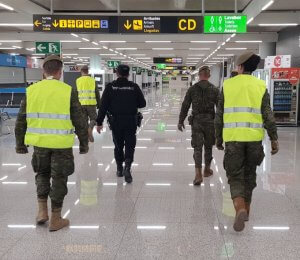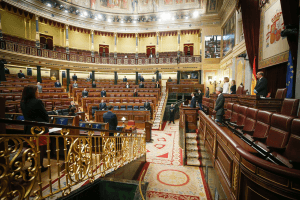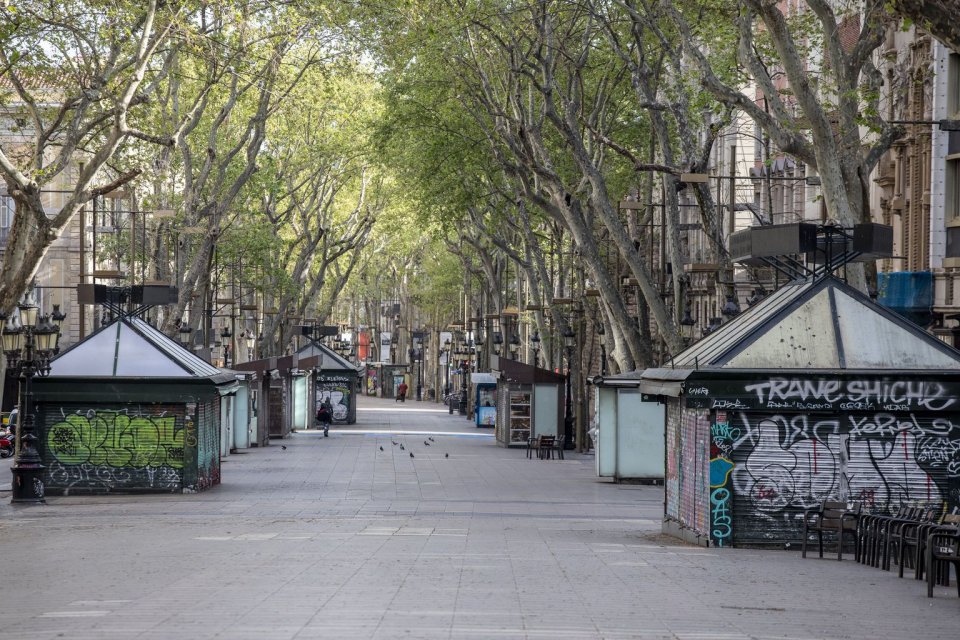Latest: Coronavirus in Spain figures (31 May)
Please support Spain in English with a donation.
Report below updated in Spain at 12.25pm on Friday 15 May
CORONAVIRUS in SPAIN – today’s figures
The latest official figures* for Coronavirus (Covid-19) released by Spain’s Health Ministry in Madrid at 11am on Friday 15 May confirm that 27,459 people have now died from the pandemic in Spain, up by 138 on yesterday.
Thursday had seen an increase of 217 Coronavirus-related deaths over Wednesday. Wednesday had been an increase of 184 over Tuesday. Tuesday had been 176.
The current peak of recorded deaths related to Coronavirus in a 24-hour period in Spain was on 2 April, when 950 deaths were registered.
Official figures released daily by the Spanish Health Ministry are for the total number of people who have tested positive for Coronavirus only through a PCR test (polymerase chain reaction). That figure for Friday 15 May is 230,183 – an increase of 546 over yesterday.
367 of the 546 new infections registered on Friday are of healthcare workers, according to Fernando Simón, director of the ‘Coordination Centre for Health Alerts and Emergencies’, which reports to Spain’s Health Ministry.
Thursday’s figure for the increase of infections tested only through PCR had been 506 over Wednesday. Wednesday’s comparative figure had been 439 over Tuesday. Tuesday had been 426.
A total figure also released today by the ministry for those who have tested positive through PCR and antibody testing, however, is 274,367 (230,183 PCR; 44,184 antibody).
The current peak of recorded infections for a 24-hour period in Spain was on 31 March, when 9,222 new cases were registered (including from PCR and antibody).
144,783 people have now made a full recovery.
With regards the official figures released by the central Health Ministry for each region of Spain, there have been discrepancies in the data released independently by some of those regions, particularly for Madrid and Catalonia. Please refer to *Health Ministry data and regional discrepancies below.
Of the official figures released by the ministry today – and based only on the total 230,183 confirmed cases through PCR testing – there have now been 66,005 cases in the Madrid region and where 8,809 have died (from the total 27,459 across the country). There have been 55,464 cases in Catalonia and where 5,882 have died.
There are now 13,257 known cases in the Basque Country (1,454 deaths), 12,401 in Andalusia (1,344), 16,513 in Castilla La Mancha (2,870) and 10,813 in the Valencia region (1,358).
Figures for those infected with Coronavirus in other regions are now as follows: Aragón 5,432 (837 deaths), Asturias 2,359 (310 deaths), Balearic Islands 1,967 (216), Canary Islands 2,280 (151), Cantabria 2,263 (206), Castilla y León 18,272 (1,930), Ceuta 116 (4), Extremadura 2,933 (494), Galicia 9,323 (601), Melilla 119 (2), Murcia 1,534 (143), Navarra 5,116 (500) and La Rioja 4,016 (348).
A full breakdown in Spanish of the data per region, together with age group statistics can be found by clicking here. Please also see Health Ministry data and discrepancies below.
ALSO READ: Lifting of lockdown in Spain – full details of all phases & regions
Sign up for our FREE Weekly Newsletter

CORONAVIRUS in SPAIN
What other areas will now move to Phase One?
On Monday 11 May around 51% of the Spanish population moved to Phase One of the government’s four-phase plan to lift lockdown restrictions.
Later today (Friday), the Health Ministry is likely to announce what other regions and provinces can now move to Phase One from Monday 18 May – after various regional authorities have presented new proposals. In Catalonia, for example, the regional government has now proposed to the Health Ministry that the areas of Garraf, Baix Montseny, and Alt Penedès move to Phase One from Monday.
Although the Catalan authorities have not proposed that the city of Barcelona or its metropolitan areas (both north and south) should move to Phase One yet, they have proposed relaxing some of the restrictions there, as a sort of ‘Phase Zero and a half’.
We have published all the key rules and measures regarding the four phases in a separate report, together with the current ‘phase status’ for each region and province. It is regularly updated as and when new measures are announced – and we will be updating it during today with any new details regarding each region’s phase status. The report can be found here: Lifting of lockdown in Spain – full details of all phases for all regions.
14-day self-quarantine measures start today for international arrivals
All international travellers arriving to Spain will have to self-quarantine for 14 days, starting from today, Friday 15 May, following an order published in the Boletín Oficial del Estado (BOE) by the Interior Ministry.
The order will remain in place during of the ‘state of alarm’, currently due to end on 24 May. If the ‘state of alarm’ is extended further, then the quarantine restrictions would continue.

During 14 days, international travellers arriving in Spain will have to stay at home or wherever they are due to lodge, and their movements will be limited to basic activities only, such as buying necessary products or for health reasons.
Those crossing the border into Spain will also be obliged to wear a face mask and comply with all hygiene and safety measures. Cross-border workers, freight drivers, cargo workers, transport crew, diplomatic staff and health workers are to be excluded from this rule, as long as they have not been in contact with anyone diagnosed with Coronavirus.
All travel agencies and transport companies need to inform their clients of these measures before confirming the sale of tickets to Spain. Airlines have to hand forms to passengers for details of where they will be staying, and these will have to be completed by travellers to Spain on arrival.
The order in the BOE also still restricts the entry to ports and airports to Spanish nationals, residents in Spain, and those who arrive for work reasons.
ALSO SEE (23 March): The new restrictions at Spain’s airports, ports and land borders
The restrictions come on top of those previously adopted at land borders with France and Portugal and the restrictions on the entry of travellers at external borders (originating in countries from outside the Schengen area) at ports and airports.
The Boletín Oficial del Estado (BOE) states that from midnight on 15 May, only the following may come into ‘national territory at internal borders through ports and airports’:
- Spanish citizens.
- Residents in Spain, accrediting their primary residence.
- Cross-border workers.
- Healthcare professionals or those who look after the elderly to exercise their labour activity.
- Those people who can show documentary evidence of causes of force majeure or a situation of need.
Protests in Madrid’s affluent Barrio de Salamanca
For several days running, small protests have been taking place in some areas of Madrid against the ‘state of alarm’ – specifically in the affluent Barrio de Salamanca of the capital. Groups of protestors have been taking mainly to the street of Núñez de Balboa at around 9pm each evening, banging pots and pans.
Although the time coincides with one of the time slots when adults are officially allowed to leave home and take walks and physical exercise, videos posted on social media and reported in the Spanish press show that the protestors are hardly maintaining ‘social distancing’ measures.
¡MILES DE PERSONAS! ¡AHORA MISMO! ¡ESTO YA NO TIENE MARCHA ATRÁS! Ahora mismo aquí en calle Nuñez de Balboa, Barrio de Salamanca, Madrid #paseamosjuntos #nuñezdebalboa #cacerolada #vivaespaña #libertad ?? pic.twitter.com/iV6HSn5Tbm
— Resistencia Democrática | Mov. Barrio Salamanca (@paseamosjuntos) May 13, 2020
Chanting ‘freedom’ and ‘liberty’ as they bang pots and pans, the protestors are rallying against the prolonged ‘state of alarm’ imposed by the Spanish government of prime minister Pedro Sánchez, and also against his handling of the crisis. Many observers, however – whilst also pointing out that some protestors have been seen holding golf clubs – have suggested that the protest is more to do with the fact that ‘affluent Madrileños’ are still being prevented from travelling to their second residences across Spain, as the Madrid region remains in Phase Zero.
Today, Friday 15 May, is a holiday in Madrid, as the capital celebrates its annual San Isidro festival and long weekend, yet still with many lockdown restrictions in place.
State of Alarm to be extended further?
Spain has now completed two months in the ‘state of alarm’ that commenced on 14 March – and it could possibly be extended until towards the end of June.
Last Wednesday 6 May, the Spanish Congress voted to extend the ‘state of alarm’ for a fourth time – until 24 May.

Each time the ‘state of alarm’ has been extended up to now, it has been for two weeks at a time. However, the Spanish government is now considering to propose a four week extension, taking it until 23 June.
Spain’s first deputy prime minister Carmen Calvo has been in touch with several parties in the past few days in search of support for a fifth extension of the exceptional measure, which will otherwise expire at midnight on Saturday 23 May.
Spanish Prime Minister Pedro Sánchez has insisted that the ‘state of alarm’ is necessary in Spain in order to effectively carry out his government’s four-phase plan to gradually lift the lockdown restrictions over a period of eight weeks, and in order to return the country to a ‘new normality’ by the end of June.
Sign up for the FREE Weekly Newsletter
Please support Spain in English
*Health Ministry data
From 24 April, Spain’s Health Ministry changed its criteria for Coronavirus statistics. The official daily figure for the number of infections is now for those tested only via PCR (polymerase chain reaction).
All regions of Spain must now also report deaths and intensive care unit (ICU) admissions in the same way. A victim can only be counted in the death tally if they have tested positive for Covid-19 via a PCR or rapid test.
Health Minister Salvador Illa said, ‘Spain is following a very strict definition of cases in line with international authorities, including the World Health Organization (WHO) and the EU Centre for Disease Prevention and Control (ECDC). Anyone who tests positive for Covid-19 and then dies is considered a Coronavirus fatality’.
Up-to-date WHO advice and facts (in English) about the Coronavirus epidemic can be found here: www.who.int/emergencies/diseases/novel-coronavirus-2019/technical-guidance.
ALSO READ: Welcome to ‘Valencia in English’
Our previous reports on Coronavirus in Spain:
ALSO READ: Coronavirus in Spain full update (14 May)
ALSO READ: Coronavirus in Spain full update (13 May)
ALSO READ: Ryanair plans to restore 40% of flights from 1 July
ALSO READ: Coronavirus in Spain full update (12 May)
ALSO READ: Coronavirus in Spain full update (11 May)
ALSO READ: La Liga players back in training, with games to possibly restart on 20 June
ALSO READ: Opinion: It’s common sense … isn’t it?
ALSO READ: Children enjoy first ‘hour of freedom’ in 43 days
ALSO READ: Opinion: why bullfights should stay cancelled after Covid-19
ALSO READ: Pedro Sánchez seeks cross-party ‘Moncloa Pact’ for recovery programme
ALSO READ: Co-Vida: an inspiring community action project
ALSO READ: One day more, one day less
ALSO READ: ‘Up on the Roof’ – surviving lockdown from above
ALSO READ: Open Arms refugee NGO helping to combat Coronavirus
ALSO READ: Coronavirus in Spain: unemployment figures worst on record
ALSO READ: FC Barcelona players agree to 70% pay cut, and will ensure staff receive 100%
ALSO READ: Animal rights NGO starts petition against possible state aid for cancelled bullfights
ALSO READ: Spain publishes list of hotels that will remain open
ALSO READ: The new restrictions at Spain’s airports, ports and land borders
ALSO READ: Walking a goat or a Vietnamese pig is not allowed
ALSO READ: Coronavirus in Spain – full advice for British travellers seeking to return to the UK
ALSO READ: Despite lockdown, Spaniards applaud health workers from balconies every evening
Sign up for the FREE Weekly Newsletter from Spain in English


